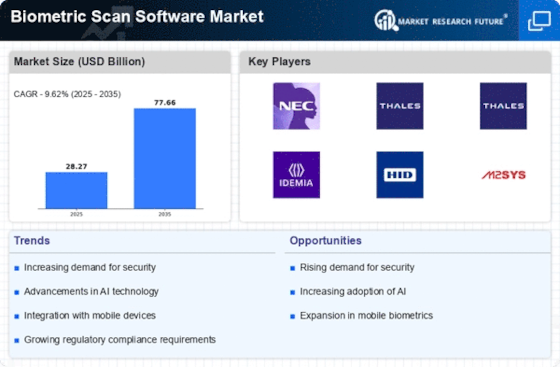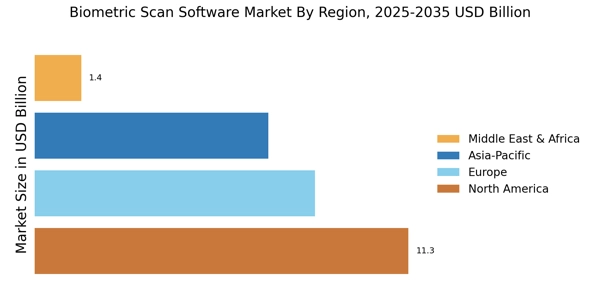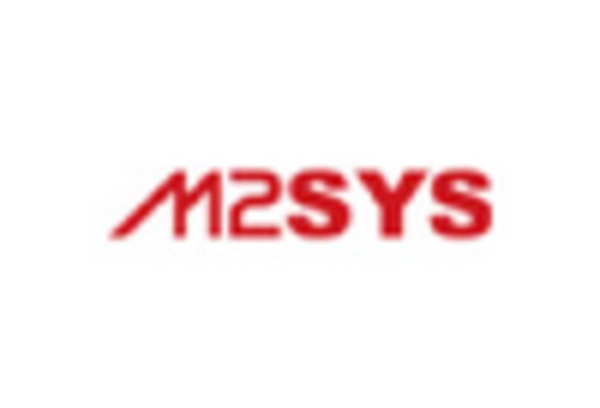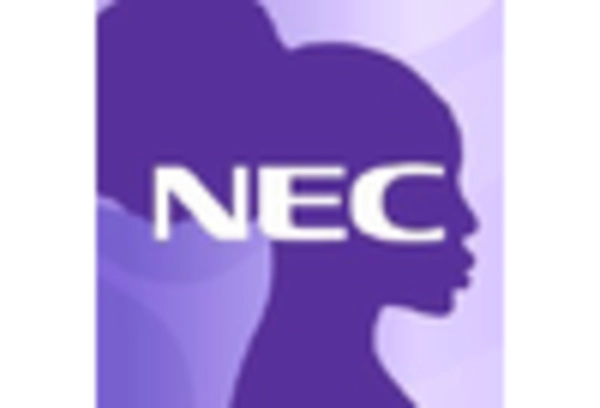Expansion of E-Government Services
The expansion of e-government services is significantly influencing the Biometric Scan Software Market. Governments worldwide are increasingly adopting biometric technologies to enhance service delivery and improve citizen identification processes. This trend is evident in various applications, including voter registration, passport issuance, and social welfare programs. The implementation of biometric systems in these areas is expected to streamline operations and reduce fraud. As governments invest in digital transformation initiatives, the biometric scan software market is poised for growth, with projections indicating a potential increase in market size as more countries adopt these technologies to improve public services.
Rising Demand for Enhanced Security
The increasing need for robust security measures across various sectors is a primary driver for the Biometric Scan Software Market. Organizations are increasingly adopting biometric solutions to mitigate risks associated with unauthorized access and identity theft. According to recent data, the biometric market is projected to reach a valuation of approximately 50 billion dollars by 2026, indicating a compound annual growth rate of around 20%. This surge is largely attributed to the growing concerns over data breaches and the need for secure authentication methods. As businesses and governments prioritize security, the demand for biometric scan software is expected to escalate, thereby propelling the market forward.
Growing Adoption in Healthcare Sector
The healthcare sector's increasing reliance on biometric technologies is a notable driver for the Biometric Scan Software Market. Biometric solutions are being utilized for patient identification, access control, and secure data management. Hospitals and clinics are implementing these systems to enhance patient safety and streamline operations. Recent statistics indicate that the healthcare biometric market is expected to grow at a rate of approximately 25% annually, reflecting the sector's commitment to improving security and efficiency. As healthcare providers continue to prioritize patient data protection and operational efficiency, the demand for biometric scan software is likely to rise, contributing to the overall market expansion.
Rising Awareness of Data Privacy and Compliance
The heightened awareness surrounding data privacy and regulatory compliance is a critical driver for the Biometric Scan Software Market. Organizations are increasingly recognizing the importance of adhering to data protection regulations, such as the General Data Protection Regulation (GDPR). This awareness is prompting businesses to invest in biometric solutions that not only enhance security but also ensure compliance with legal standards. As companies strive to protect sensitive information and avoid potential penalties, the demand for biometric scan software is likely to grow. This trend indicates a shift towards more responsible data management practices, further solidifying the role of biometric technologies in various industries.
Technological Advancements in Biometric Systems
Technological innovations play a crucial role in shaping the Biometric Scan Software Market. The advent of advanced algorithms and machine learning techniques has significantly enhanced the accuracy and efficiency of biometric systems. For instance, facial recognition and fingerprint scanning technologies have evolved, allowing for faster processing times and improved user experiences. The integration of artificial intelligence into biometric systems is also noteworthy, as it enables real-time data analysis and adaptive learning capabilities. This technological evolution is likely to attract more users and organizations, further driving the growth of the biometric scan software market, which is anticipated to witness a steady increase in adoption rates.

















